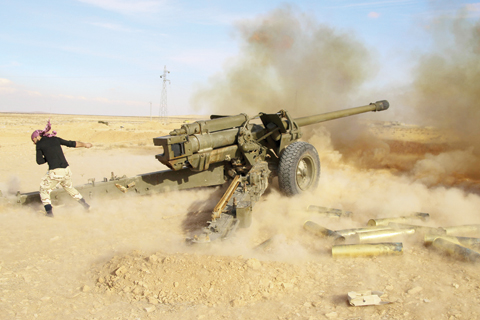 MAHIN: Syrian government troops fire at Islamic State group positions near Mahin, Syria. The nearly five-year Syrian conflict has left at least 250,000 people dead, forced millions to flee the country and given an opening to the Islamic State group to capture territory in Syria and Iraq. — AP
MAHIN: Syrian government troops fire at Islamic State group positions near Mahin, Syria. The nearly five-year Syrian conflict has left at least 250,000 people dead, forced millions to flee the country and given an opening to the Islamic State group to capture territory in Syria and Iraq. — APROME: The United States and Italy warned yesterday that the Islamic State (IS) group is expanding its reach, threatening to seize Libya and launch attacks in Western countries. But as representatives from the 23 countries of the US-led coalition battling the jihadists' self-declared "caliphate" reviewed their progress at talks in Rome, Italy and France made it clear military action against IS's Libyan wing is not on the immediate agenda. Italian Foreign Minister Paolo Gentiloni and US Secretary of State John Kerry opened the talks by telling their allies that, since their meeting six months ago, the IS group had suffered setbacks in its core territory in Syria and Iraq.
But the hosts warned that the group is adapting to the pressure on its heartland and is redirecting its efforts towards Libya, where it has seized new territory, and into attacks like those in Paris, Ankara and San Bernadino, California. "We are surely not here to brag about anything," Kerry said, after saying IS fighters have lost 40 percent of their territory in Iraq and 20 percent in Syria. "We're here to recommit, we're here to re-evaluate, we're here to make judgments about things we have started that we could do better," he said.
Gentiloni said the challenge facing the coalition of mainly Western and Arab nations is stark. "We know that we have in front of us an organization that is very resilient and able to plan strategically and so we should not underestimate it," he said. "If anything we need to be ever more wary and more watchful because we know that the more Daesh is squeezed in its core territories, the more tempted it is pursue its terrorist activities elsewhere," he warned, using an Arabic acronym for IS. "We are witnessing renewed activity in Libya and in sub-Saharan Africa," he said. Within the coalition, Italy has taken the lead in planning how to address the IS threat which is just a short boat ride from its southern shores, in and around the Libyan city of Sirte.
No military intervention
Rome's focus is on trying to rally the international community behind efforts to create a national unity government in Libya that is capable of stabilizing its former colony. Direct military intervention against IS fighters is not on the immediate agenda, French Foreign Minister Laurent Fabius told reporters, rubbishing reports that Paris was pushing for strikes. "There is absolutely no question of military intervention in Libya," Fabius said. "There is pressure (for that) but that is not the position of the government." Gentiloni told the Messagero daily time was running out to stabilize Libya but stressed there was no enthusiasm in Rome or the international community for "hasty military intervention." Washington says it has built a 66-nation coalition to fight the IS group, with Afghanistan becoming the latest country to join, Kerry said.
But a so-called "small group" of 23 nations has taken the lead in carrying out air strikes in Iraq and Syria and training and arming local forces to fight the jihadists. Kerry said the effort now needs to be stepped up, citing the example of Washington's deployment of small numbers of special forces troops inside Syria. The allies need to "push ahead with a strategy we have learned will work and to do so relentlessly, giving Daesh no time to regroup, no place to run, no safe havens in which to hide," he said. Fabius said France also supported intensified strikes in Syria but suggested "more strategic" targeting was required while peace talks are under way in Switzerland. "We cannot bomb in Syria and negotiate in Geneva," he said in an explicit allusion to Russia's air campaign in Syria.- AFP









